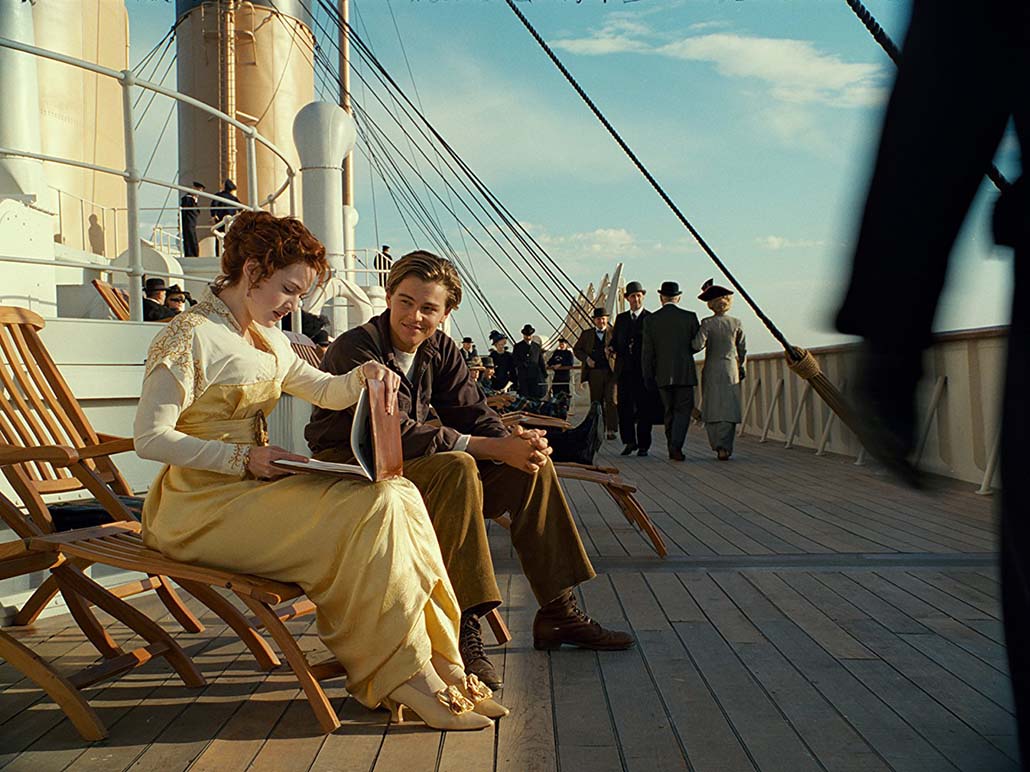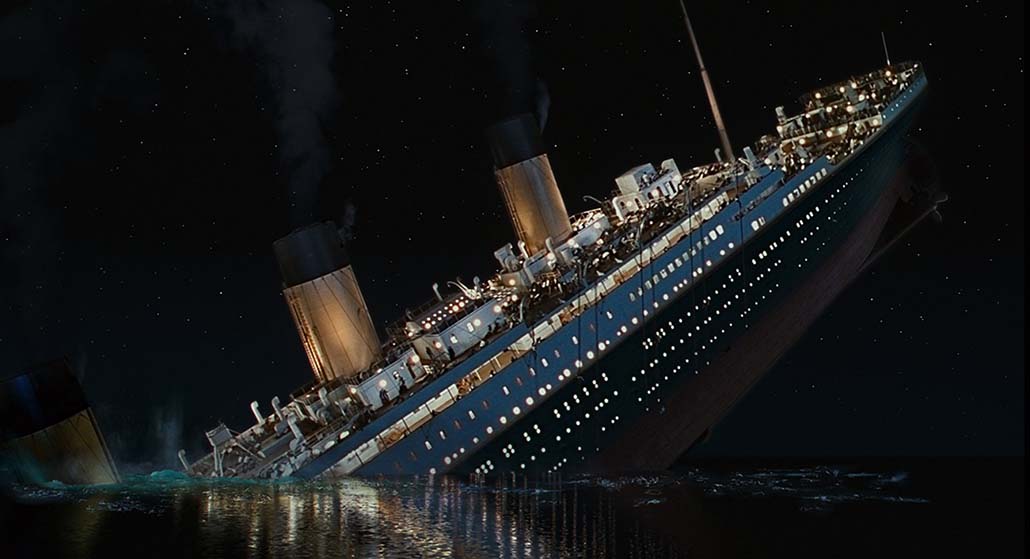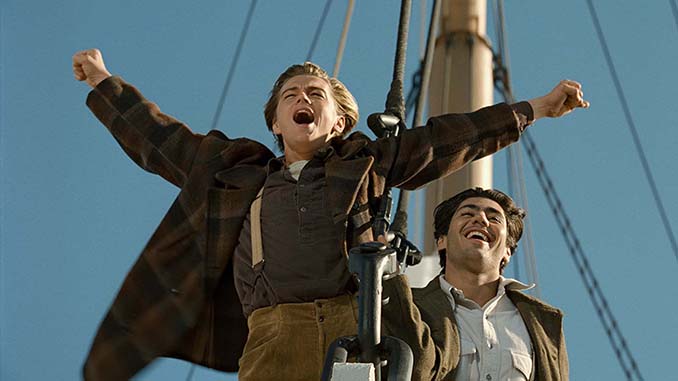by Nick Spark
Nick Spark: How was it that you ended up in the film business?
Conrad Buff: At a very early age, like 7 or 8, I became interested in photography, and simultaneously I was interested in magic and things theatrical. The light bulb went off: film, ahhh! I saved up enough money to buy an 8mm camera when I was about 11. At that age I was interested in fantastic films, Ray Harryhausen types of stories. Visual effects or special effects became fascinating to me. How did they do that? So I started reading and ended up making 8mm stop-motion clay dinosaur movies.
I attended Pasadena City College for a couple of years – and was planning on transferring to USC or UCLA for film school. However, it was during the Vietnam War and I dropped a class the last semester. And I was unlucky enough to then get a notice that I needed to take a physical – wow! It was a very black period in my life. It turned out that the gods were looking out for me at that point, because the recruiter that I went to talk to referred me to a commander who was in charge of the Navy’s Motion Picture Office in Hollywood. I took over some of my films – and I guess impressed him enough. There was a slot opening in Washington, D.C. for someone in an eight-man documentary film unit. They had this huge production facility which we were a very small part of, but we had access to sound stages, mixing stages, film labs, Steenbecks and Arriflexes and Eclairs. So something I thought was going to ruin my life actually became a positive experience.
Nick Spark: Did you always want to be a feature editor?
Conrad Buff: I always had an eye on wanting to cut features, but I didn’t know anybody, didn’t know how to do it, and at one point I had an opportunity to work as an apprentice at Universal, and work up in a traditional way, but it didn’t interest me enough – I didn’t want to carry cans. I was editing commercials at that point and had learned a great deal about optics. A friend of mine called me one day and said, we need an assistant who’s in the union, who really knows optics. And I said, “me”. It turned out to be the original ILM that at that time had done Star Wars and was doing the television series, Battlestar Galactica.
“I think it’s good to have someone else to bounce things off and help you see things from a different viewpoint, rightly or wrongly.” – Conrad Buff
I was there three months and Richard Edlund liked me and said, listen, ILM is going to be moving up north and we need someone to run the editorial department, would you be interested? And having always wanted to leave LA and go to Northern California and get paid and of course work on Empire Strikes Back, how could I say no? That was a great break. I ended up working in northern California for five years.
When I returned to Los Angeles…I was asked if I would work on Jagged Edge, and I got to do some editing. I was bumped up on that show and I’ve been an editor ever since.
Nick Spark: Titanic was the fourth picture that you worked on with director Jim Cameron and the third with editor Richard Harris. Were you aboard Titanic from the very beginning?
Conrad Buff: Jim was going to edit the film himself, originally. And I had only heard that second-hand, I never heard it from him… I personally couldn’t see that happening, not because he was incapable, but because the demands of meeting a release deadline and directing a film of that magnitude sort of preclude your ability to come up with a cut. So I thought, this is going to change at some point. But I wasn’t sitting back and waiting for the phone call. I kept busy doing other projects and then one day, when I had just finished Dante’s Peak, I got a call from the associate producer. They had been in production for two or three months, and not a whole lot had been done. Some of the early things had been assembled. Richard Harris had actually begun before I did by more than a month, maybe two.
Nick Spark: What is it like working with Jim Cameron?
Conrad Buff: Jim shoots an enormous amount of material an enormous amount of very good material which makes it all the more subjective, in terms of what do you use, and where do you go, because the choices are so rich. So you want to be very judicious and there are so many ways that one could put it together. That alone gives us an enormous amount of freedom editorially, at least initially. Which is a great treat. It is great to have such awful decisions to make!

Scene from Titanic. Courtesy of Paramount Pictures. Copyright 1997
Nick Spark: Titanic‘s ever-changing schedule became, in some sense, as epic a story as the picture itself. How did that impact the editing process?
Conrad Buff: I began in February, I think, of last year. And at that time the film had an early July release date. And for the longest time we lived with that date, and I just kept thinking, God, it’s going to be the biggest mistake they ever made. And it turned out to be the best thing they ever did of course to change it. It was less for the editing and more for the visual effects, because they were not going to be done. But from an editorial standpoint, you know, as always you need a lot of time to let it percolate, and think about it, get away from it, get feedback. That schedule didn’t allow for much of that. But by the time it made it to the first preview, which was around the 15th of July – and the release date had changed by then – from an editorial standpoint the picture was well structured and pretty much locked
Nick Spark: Were you under intense pressure to complete the film?
Conrad Buff: You know, I was fairly insulated from any of that. The pressure was pretty much on Jim, and I was there to help him and do what I can do as an editor, try to provide him with as many positive versions of scenes as I could. And of course when he sees that it is working that lightens the load. He was always very confident in the picture. But I know there was just enormous, enormous pressure on him. Clearly he has a history of dealing with these sorts of pressures. This was probably the most extreme, of course, but all of his films have sort of pushed the budget envelope and the visual effects envelope. He sort of thrives in that environment, too.
Nick Spark: How did the three of you develop a strategy to work together, and what was that process like?
Conrad Buff: All of us had worked together before, of course. Initially people took different chunks of the film, but to a lesser degree than, say, True Lies which Richard and I and Mark Goldblatt had done together. There we tried to take major sections, handling them independently, with Jim overseeing it. In this case, ultimately the final cut was left in Jim’s hands. There was a big exchange of things. There were scenes that Richard had cut that I ended up recutting, scenes that Jim had done that Richard would recut, and Jim would recut some of what Richard and I both had done. It was a real mix, and I’m not certain it was the best way to do it, and ultimately I feel like the film could be editorially finessed a little beyond where it ended up. But I can’t argue with success.

“Poop deck” scene from Titanic. Courtesy of Paramount Pictures. Copyright 1997
Nick Spark: With all of the incomplete or missing effects in the show, were you “flying blind” at all during the editorial process?
Conrad Buff: Only in one area, really, and that was the infamous – what we called the poop deck sequence. That was where the ship elevates, splits in half, falls back down, then elevates again and then sinks. It was composed of all kinds of techniques and elements, and it was something that all of us were apprehensive about, in terms of, gee, is this going to work? The first thing I was assigned by Jim while he was in Mexico was to take that sequence and put it together, and I used everything that I possibly had available, from storyboards to green screen foregrounds to arbitrary bits of action that were not even necessarily designed for that area to communicate the timing and feel and structure, what the ultimate pattern was going to be. And get a sense of the overall timing and whether it was working. I think it was an area that Jim was very concerned about because he had shot so much material for it, and probably didn’t completely know whether he had it in hand or not. I spent two weeks putting it together and sent it off to him in Mexico. And then I didn’t hear anything from him for two weeks and I thought, oh my god, he hates it. I think the reason he didn’t respond, as I found out, was he was actually quite pleased and had a confirmation that it was working.
Nick Spark: Perhaps the biggest departure for this picture is that the effects in every instance are intended to support the narrative —
Conrad Buff: It is nice to see them applied to something that isn’t fantastic in the old sense of the word, like a Ray Harryhausen film. It is fun to see them applied to something that is not specifically an effects-driven picture. It is a good indication of how things are going, that effects will be applied in a quiet and seamless way and will affect all aspects of production design. I think how we approach certain scenes will be done differently in the future. So it will be fun to see. Terribly expensive, but I think that is changing as well. It’s exciting.
Nick Spark: Was anything drastically changed by the editorial process?
Conrad Buff: Well, the ending of the film became quite different. It was recut to alter what was shot in the present day material, on the ship with the Bill Paxton character. There is a sequence at the end where Rose throws the diamond away, and on the page and as shot it was quite different from what you see in the film. Editorially it was a real exercise to alter that. It required a couple of pick-up shots, but I was able to structure it to determine the two shots that we needed to make it work and eliminate a lot of extraneous dialogue and emotional stuff with the Bill Paxton character that we didn’t need, and which at that point you just didn’t want. You wanted to be with Rose and Jack.
“Jim [Cameron] shoots an enormous amount of material an enormous amount of very good material which makes it all the more subjective, in terms of what do you use, and where do you go, because the choices are so rich.” – Conrad Buff
Nick Spark: Did you have any sense how successful the film would be?
Conrad Buff: I was always very nervous, actually. I really thought, as interesting as the elements are and as visually interesting as it all is – I really had reservations about people’s ability to sit there for three hours. Would they put up with that? I was very concerned about that. But I certainly trust the director’s instincts, and it was always designed to be a three hour picture and was sold to Fox that way. But I had not a clue that it would be so popular.
Nick Spark: Will we begin to see more and more directors taking a hands-on approach to editing?
Conrad Buff: I think it’s good to have someone else to bounce things off and help you see things from a different viewpoint, rightly or wrongly. Even Jim admitted to me that he appreciated having an objective third party, somebody who can see things from a different perspective, a different way, because it stimulated him. The Avid is a tool, and some people will be able to use it, but let’s face it, I respect the art of editing, and there is still room for us – independently of directors – to do what we do. I know of films where an Avid has been installed for the director, but I don’t think they have the years of experience and skill that is still required of an editor. Editing a scene from scratch and making it play, is still a difficult job that requires skills that I don’t think all directors have. I don’t think all directors want to be editors. They are not all chomping at the bit to get in there. There are a few people. Jim. Robert Rodriguez. Paul Verhooven, I think, had an Avid set up for awhile. I wouldn’t be surprised if we see them more and more. But whether they are doing any editing, or using it as a tool to review material as you would a KEM, it’s hard to say. I think only a handful could get down to brass tacks.
Nick Spark: How did it feel to win an Oscar?
Conrad Buff: Euphoric. Clearly it is an absolutely wonderful treat. A great honor and all of that. I was thrilled. I wasn’t expecting it. Everyone kept telling me, “It’s yours, it’s yours”, and of course the more people said that the less I wanted to believe it! And certainly it is staggering when your name is called. It is a great feeling. The whole thing is phenomenal in every way. I am delighted. Absolutely delighted. And still enjoying it. I still think about it, and I am sure I will forever. There isn’t a better reward for our work than that, you know. It is great fun.
Nick Spark: Anything else you would like to add?
Conrad Buff: I would have to thank our crew, our assistants and editorial staff, who were under much more pressure than I was, and did a fantastic job supporting four Avids, and keeping three editors all in sync and all balanced and all at the same time. It was an enormous task, having to constantly update the visual effects and interact with the visual effects – the millions of dollars that were involved in that film – it was just a huge undertaking so they deserve a lot of credit for keeping us on the straight and narrow.


